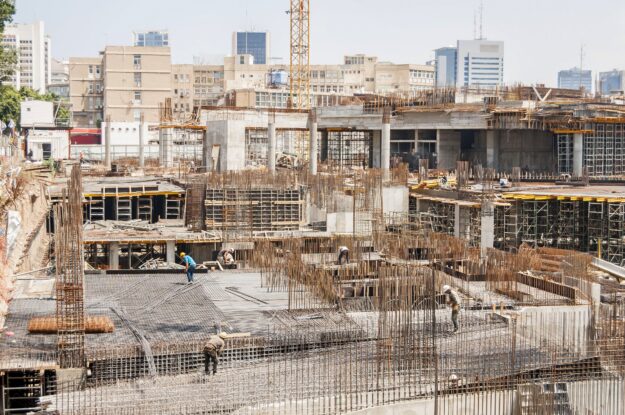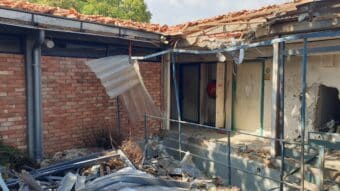Israel’s housing market is facing a deepening crisis as construction slows dramatically across the country. New data reveals double-digit declines in construction starts, building permits, and completions in early 2025, alongside severe setbacks in urban renewal projects. The average construction timeline has now reached nearly three years, while thousands of families remain in unprotected or temporary housing. Industry leaders warn that unless bureaucracy is reduced and the shortage of foreign workers addressed, delays will worsen, further shrinking supply. With demand expected to surge once the war ends, the question many are asking is: will property prices go up in Israel after the war? Experts believe the answer is yes — echoing the sharp increases seen after the COVID pandemic.
While most eyes are understandably focused on Israel’s current wartime reality, a quieter storm is brewing in the real estate sector — and it may hit home buyers hard in the months and years ahead. According to new data released by Israel’s Central Bureau of Statistics (CBS), there has been a steep and ongoing decline in construction activity across the country. If this trend continues, many experts believe home prices could surge once the war ends and demand returns.
Construction Starts Plummet
In the first quarter of 2025, only 17,300 new homes in Israel began construction — an 11.9% drop compared to the final quarter of 2024. Of those, just 16,000 were net additions after accounting for units demolished under urban renewal programs.
Even more alarming is the 34.9% decline in building permits, the earliest and clearest signal of future construction activity. Without a pipeline of permits, new projects won’t break ground — and without new projects, supply will dry up.
The situation is especially stark in the Tel Aviv and Jerusalem districts, where housing demand is strongest. In Tel Aviv, construction starts dropped by 26%, while the Southern District saw a staggering 41.3% decline in new building permits.
Longer Timelines, Fewer Completions
The slowdown doesn’t end with permits. Even homes already under construction are taking longer to complete. In the first quarter of 2025, just 12,000 units were finished — a 21.6% decline from the previous quarter. Over the past 12 months, completions are down 14.4%, and average construction time has ballooned to nearly three years, well above international norms.
This is due to a combination of factors: regulatory delays, cumbersome bureaucracy, and perhaps most critically, a severe shortage of construction workers, especially foreign labor, who have not been replaced at scale since the war began.
Urban Renewal Hit Hard
Urban renewal — a key driver of new housing in high-demand, central areas — has been especially hard hit. Projects under TAMA 38/2 and pinui-binui (evacuation-reconstruction) frameworks saw a 27.5% drop compared to the same period last year.
In the first quarter of the year alone, only 3,488 homes were started under these frameworks, with the vast majority concentrated in the Tel Aviv and Central districts. These types of projects are crucial for increasing supply in densely populated urban cores, where new land is scarce. Their slowdown could have long-lasting consequences.
Thousands Displaced, Homes Destroyed
Beyond the slowdown in construction, Israel’s housing crisis is compounded by the devastating toll of the war itself. Thousands of homes across the country have been damaged or destroyed by missile fire, leaving entire communities displaced. Families are living in temporary housing with no clear timeline for return. Even among homes that remain intact, many lack protected spaces (mamad), making them unsafe for continued use during times of conflict. The long-term rebuilding of destroyed areas — alongside the urgent need to replace or retrofit unprotected housing — will place even greater pressure on an already strained supply pipeline and further delay the availability of livable homes across the country.
Confidence in Israel: The Beginning of a New Phase
Since the launch of Operation Rising Lion on June 13, Israel has demonstrated clear determination and strategic strength, striking deep into Iran and targeting missile systems, air defenses, and nuclear infrastructure, dealing a significant blow to Iran’s military capabilities. The recent dramatic U.S. strikes on Iran’s nuclear sites mark both a sharp escalation in the conflict and a clear shift in momentum. After months of uncertainty, and with American involvement, there’s a growing sense that Israel is turning a corner — not only militarily, but emotionally and nationally.
With time, that same sense of determination will undoubtedly shape Israel’s economic recovery. As confidence returns — and please G-d, it will — it will be felt not only in Israel’s streets but also in its housing market. The world will begin to see Israel not as a country in crisis, but as one rebuilding stronger than before. Interest from both local and international buyers is expected to rise significantly.
What It All Means: A Coming Price Surge
If supply continues to fall while demand rebounds, the result will be classic market pressure — fewer homes, longer wait times, and property prices going up across the country. Amit Gottlieb, Chairman of the Tel Aviv and Central District Contractors and Builders Association, put it plainly:
“The real estate industry is at an unprecedented low… Once the war ends, we will see apartment prices rise significantly — similar to what we saw during the Corona pandemic.”
So, When Will Property Prices Go Up?
Right now, with the war ongoing and many buyers hesitant, the market is relatively subdued. Developers are offering discounts, and in some cases, are willing to negotiate. But that won’t last.
If this truly is the beginning of the end — as many believe — 2026 could bring a sharp rebound, just as it did post-COVID. With so few new homes in the pipeline and delays in completions, prices are likely to move quickly once momentum shifts.
For buyers who believe in Israel’s long-term future — and understand that moments of crisis often pave the way for growth — this may be a rare window of opportunity. As construction slows and future inventory shrinks, the next 12 to 24 months are likely to bring fewer choices and rising prices, making now a compelling time to buy property in Israel.
The Buyitinisrael Editorial team is made up of industry experts, journalists, researchers, editors, and translators working together to deliver reliable, up-to-date information about the Israeli property market — all in English. With a strong focus on transparency and accessibility, our goal is to empower English-speaking buyers by helping them understand the market and navigate the real estate process with clarity and confidence.
For inquiries, email info@buyitinisrael.com.







